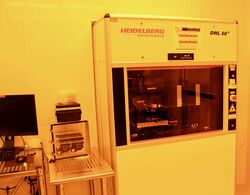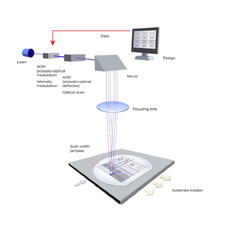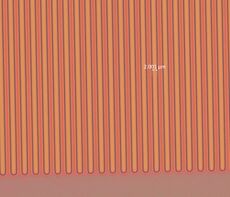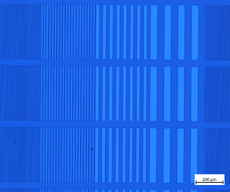Difference between revisions of "Heidelberg DWL 66+ Laser Writer"
| Line 18: | Line 18: | ||
== Description == | == Description == | ||
The fully automated DWL 66+ laser writing system has both binary (2D) and grayscale (2.5D) exposure capability. | The fully automated DWL 66+ laser writing system has both binary (2D) and grayscale (2.5D) exposure capability. | ||
| − | [[File: DWL schematic.PNG|thumb|right|upright= | + | [[File: DWL schematic.PNG|thumb|right|upright=0.75|Schematic of pattern exposure with the DWL66+, [https://heidelberg-instruments.com/wp-content/uploads/2025/05/The-Lithographer-Surface-Issue.pdf TheLithographer.com, Surface Issue, May 2025] ]] |
The pattern is broken into vertical stripes of ~500px with preset overlap. To write each stripe, the tool modulates and deflects the laser beam based on the provided pattern data while the stage moves along Y. This process repeats along the X direction until the pattern is complete. | The pattern is broken into vertical stripes of ~500px with preset overlap. To write each stripe, the tool modulates and deflects the laser beam based on the provided pattern data while the stage moves along Y. This process repeats along the X direction until the pattern is complete. | ||
Revision as of 16:00, 24 July 2025
 |
|
| Tool Name | Heidelberg DWL 66+ Laser Writer |
|---|---|
| Instrument Type | Lithography |
| Staff Manager | Ana Cohen |
| Lab Location | Bay 4 |
| Tool Manufacturer | Heidelberg |
| Tool Model | DWL 66+ |
| NEMO Designation | LW-01 |
| Nearest Phone | 8-9799 |
| SOP Link | SOP |
Description
The fully automated DWL 66+ laser writing system has both binary (2D) and grayscale (2.5D) exposure capability.

The pattern is broken into vertical stripes of ~500px with preset overlap. To write each stripe, the tool modulates and deflects the laser beam based on the provided pattern data while the stage moves along Y. This process repeats along the X direction until the pattern is complete.
Allowed Materials
Substrates
- Mask Plates -- available in the QNF Stockroom pre-coated with AZ1500 and IP3500
- 4" wafers
- Pieceparts > 20mm x 20mm (Starting Aug 2025, DMO system is recommended for small piece part direct write)
Resists -- must be compatible with h-line/ 405nm exposure (Laser exchanged in June 2023. Previous documentation may include 365nm capability.)
Processes
Writehead Selection
Pneumatic mode not recommended for dry etch and smaller features due to focus issues -- currently working with Heidelberg service to address.
Last confirmed July 2025.
| Write Head | Focus | Mode | Notes |
|---|---|---|---|
| 10mm | -100 | Pneumatic | active problem, see note above |
| 10mm | -70 | Optical | for >2um minimum |
| 2mm | -100 | Pneumatic | active problem, see note above |
| 2mm | +40 | Optical | for >600nm minimum |
| 40mm | -100 | Pneumatic | active problem, see note above |
Exposure Parameters
Mask Plates
500nm resist thickness on chrome-coated soda lime. Development in TMAH 0.26N for 60s.
Last confirmed July 2025.
| Mask | Write Head | Filter(s) | Laser Power | Intensity | Notes |
|---|---|---|---|---|---|
| AZ1500 | 10mm | 50% | 60 mW | 90 | |
| IP3500 | 10mm | NONE | 120 mW | 90 | for <3um |
| AZ1500 | 2mm | 12.5% + 25% | 60 mW | 80 | |
| IP3500 | 2mm | 12.5% + 50% | 60 mW | 80 | for <1um |
| AZ1500 | 40mm | NONE | 220 mW | 60 |
Other direct writes
Resist on 4" silicon wafer, soft baked at 115C for 60s, development in TMAH 0.26N for 60s.
Due to the variability of resist thickness, substrate reflectivity, and the ideal profile for subsequent processes, a dose test is always recommended to confirm optimal parameters.
| Resist | Thickness/Spin Speed | Write Head | Filter(s) | Laser Power | Intensity |
|---|---|---|---|---|---|
| S1805 | 0.5um (3krpm) | 10mm | 50% | 60 mW | 70 |
| S1818 | 2.2um (3krpm) | 10mm | NONE | 130 mW | 100 |

